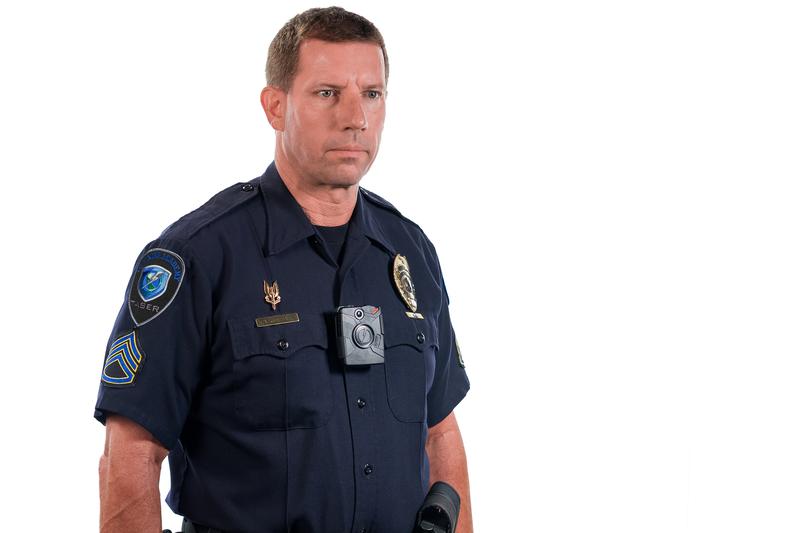
Now that a federal judge has declared New York's stop-and-frisk unconstitutional, some patrol officers will be strapping on judicially-mandated body cameras. It's a first for the NYPD — but other police departments across the country are already using the technology.
As part of her stop-and-frisk ruling, U.S. District Court Judge Shira Sheindlin ordered the NYPD to institute a pilot project "in which body-worn cameras will be worn for a one-year period by officers on patrol in one precinct per borough — specifically the precinct with the highest number of stops during 2012."
The judge said that by providing a record of interactions with the public, the cameras would give the NYPD greater "potential for avoiding constitutional violations."
Although used by smaller police departments across the country in places like Fort Worth, Daytona, and Albuquerque, the cameras aren't exactly a welcome addition to the NYPD. On Monday, Mayor Bloomberg blasted them as "a solution that is not a solution to the problem."
But other departments have embraced them.
The Mesa Police Department is currently in the eighth month of its own year-long trial program with body cameras. Sergeant Tony Landato said the cameras "really have been an assist." He added that "obviously we have mixed emotions among some of our members, there are people who don't want that 24-hour scrutiny. But overall it's been a very positive thing."
Landato says one big challenge has been the logistics of administering the program.
"You almost have to create a whole unit just to deal with the video that's been created," said Landato. "There's redaction issues for public records requests, things like that, that we're finding challenging. But...the good definitely outweighs the negatives." Landato cited one big pro for Mesa: a reduction in complaints. "A lot of times we'll remind the folks that 'oh, we have video of your interaction with our officer,' and then in some cases you've seen them back right down."
Taser International, the company that manufactures the eponymous stun gun, also makes body-worn cameras. Steve Tuttle, a Taser vice president, said the cameras can be a hard sell — until police officers discover the video can be used to back them up. And then, Tuttle mirrored Sergeant Landato's experience. "Once they've had a complaint, and realize 'Oh my gosh, there is a video of this,' that changes their feelings very quickly." Tuttle said the cameras reduced complaints against police by "a dramatic number."
And he said there was an unexpected benefit as well. Tuttle mentioned a study — also cited by Judge Scheindlin in her ruling — that showed a 59 percent drop in the use of physical force by officers who wore the cameras.
"That means we're changing the way law enforcement does business," Tuttle said. "We all behave better on camera."
That view is shared by the New York Civil Liberties Union -- which is why associate legal director Chris Dunn says the group supports their use.
"They are an effective deterrent for police abuse," he said. And "they are a guaranteed way to smoke out those instances in which police officers are falsely accused of misconduct."
In the event of an complaint, Dunn said, "when there’s a videotape you can pull it out and get to the bottom of it."
One issue that has to be resolved: privacy. Samuel Walker, an emeritus professor of criminal justice at the University of Nebraska who testified in the case, says the technology might pose threats to the privacy of everyday people.
"The camera will capture everything within its view and that will include people who are not suspects in the stop," he said. "So, will that information be stored? Will it be retained?"
Sergeant Robert Drager is the technical manager of the body camera program in Albuquerque. He says once you're crossed the logistical hurdles of the program -- is the camera recording? is the battery going to last longer than an hour? -- officers still have to deal with the massive amounts of data produced by the videos. An example: Drager says that in Albuquerque, in four months just 70 police officers have recorded 30,000 videos. And there's more.
"Officers a lot of times are seeing people on the worst day of their lives, and we're capturing that on video that's now a public record," he said. "We're in the process of trying to create an entire unit to deal with all the media requests and public records requests."
New York City will appeal the ruling, and is expected to ask a court to put the brakes on the body camera pilot until it has a chance to appeal.
Watch a body-camera recording of a Mesa Police Department officer apprehending a suspect.
